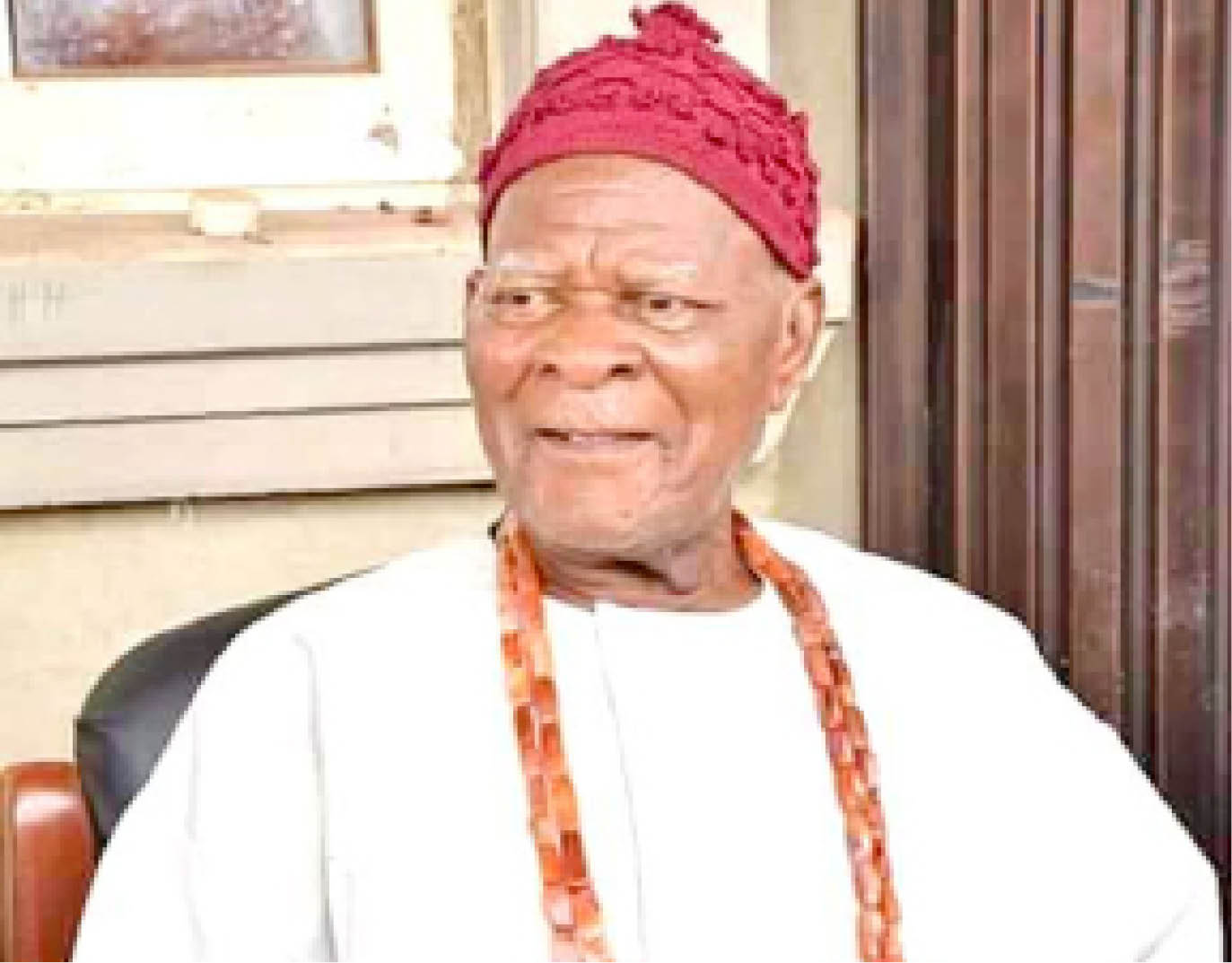The Obi of Otolo and Igwe of Nnewi, Kenneth Orizu, is one of the oldest traditional rulers in Anambra State, having spent 58 years on the throne. In this interview, the 96-year-old traditional ruler spoke on how he abolished the Osu caste system in his domain, how he combines tradition with Christianity, and other interesting issues.
You have spent 58 years on the throne. How did the journey start?
- 24 hours after IGP directive: Igboho still walks free, as victims recount ordeal
- Attack on Fulani: You can’t threaten us with war, Afenifere tackles ACF
My father died, and after his burial ceremony, I took over. Ascension to the throne is from father to son.
My mother died early, just about a week after my birth. They married many in the family, and normally, in such a situation, there were always quarrels and jealousy. Those who came before her asked why my father married her, especially from a far place called Umuchu.
When she came in, she bore a male child, so they hated and worked against her. They killed her a week after my birth.
My father did not want to take chances, so he called those women to breastfed me, but breast milk was not forthcoming. So he went to John Holt and bought a carton of milk.
They mixed the milk with coconut water and used it to feed me, and it was good for my system. That was how I was fed until I started eating solid food. God was with me and sustained my life.
When it was time for me to start school, I was enrolled in kindergarten in Nkwo Nnewi. After I did Standard One in Nkwo Nnewi Central Primary School, our in-law, who was living in Calabar, came home and told my father that he wanted me to stay with them. He granted his request and I went with him to Calabar, where I started school at Hope Waddell School. I did standards two to six there.
I came back to Nnewi when there was no money to pay my school fees. I got admission into New Bethel College, Onitsha and did up to class four and there was no money to continue. Luckily, one of my uncles, Mr Simon, took me to Kano and found a job for me. I started typing and shorthand, and within some months I was able to type 50 words in an hour.
After that, I got a job in one Syrian company, also in Kano. I was employed as an assistant produce clerk. We were into produce buying and I was in charge of groundnut and oil.
Within that period, there was one Yoruba man in charge of clearing goods from the railway station, and he never wanted to go on leave because of what he was doing there. He had accumulated arrears of leave and the company forced him to proceed and called me from the produce section to hold brief for him.
While he was there, a lot of things happened. If the company asked him to go and clear goods from the railway station, he would connive with officials to shortchange the company. If the waybill was for six consignments, he would arrange with railway officials and clear only four and they would sell two and share the money. The railway officials would write that the two consignments were lost in transit.
The Syrians did not want to take chances in their business, and that was why they forced him to go on leave and brought me in. When I worked there for some months there were clear differences as goods were no longer missing. The man could not come back to the position.
I was in that position until I decided to go home and see my father, who was sick. I wrote them that I wanted to go to the Eastern Region to see my sick father and they gave me a wonderful testimonial.
When I got home, instead of staying idle, one of my uncles who worked in the Eastern Nigeria Information Service invited me for a job. When they asked where I had worked before, I showed them the testimonial given to me by the Syrian company and they were pleased and asked me to start work immediately.
That was how I started working in the Eastern Nigeria Information Service. I rose to the position of Assistant Information Officer before my father died and I came back and took over the throne.
The Eastern Nigeria Information Service was the publisher of the National Outlook. I was the person who made people to begin to read the newspaper. When they employed me, they sent me to Port Harcourt; and when I got there, the sales were poor. The total sale for a day was about 20 copies; I increased it to 500 copies.
After that wonderful performance, they sent me to Onitsha as an assistant circulation manager. When I got to Onitsha, the sale was also poor, 50 copies a day. I also raised it to 1,000 copies per day.
From there, they sent me to go and establish their office in Asaba. When I went to Asaba, I found an office and paid for one year and employed a clerk to take charge.
They also sent me to go and establish an office in Benin.
Throughout my stay in the company, I worked with integrity and honesty because I knew that one day I would be the traditional ruler of my community.
I did not find it worthy to indulge in any dirty dealings in any organisation where I worked. The management of any company I worked took whatever I told them as the correct position. If I said that something was 10, when they checked, it would be 10. Since I could not tell lies, all the companies trusted me. They also admonished me to maintain my honesty wherever I would go in life.
And because of hard work and honesty, I was getting promotions.
What informed your decision to abolish the Osu caste system in your domain?
I abolished the system because of the level of discrimination and stigma. It was so bad that if you stayed in one place with an Osu, automatically you would become one.
Following the abolition, today we eat and associate freely with them. In those days, those who womanised saw the people as Osu in the day time but freeborn at night. What a deceit! According to our tradition, once you befriended an Osu girl, you were automatically one of them. Many people who claimed to be freeborn had many girlfriends who were Osu.
I looked at the deceit among us and said we could not continue that way, so I abolished the practice.
During one of the Ofala festivals, I proclaimed the abolishment of the system, and to the glory of God, it stands abolished.
Are you the first Igwe of Nnewi to be converted to Christianity?
No. My father was the first traditional ruler to be converted to Christianity. But our throne is tied to the tradition of our land. We combine tradition and Christianity.
There was a ceremony we called Ikwaro, which normally started from the shrine and lasted for months. It was one of the biggest festivals in the community. It was bigger than Christmas celebration. The preparation alone was wonderful and it took months. It was all about exhibition of wealth and fame. During the festival, people came out to display the number of cows they could kill. If you wanted to kill one cow you would go to Nkwo with one knife and if you wanted to kill two you would go with two knives. When people got there, there would be a lot of boasting and show of class. When people returned to their homes from Nkwo, they would decorate the cows with various regalia and people would dance in celebration. As a Christian, when I became the Igwe, I decided to do away with the festival. Christianity has worked effectively for me and the community.
Is it because you are a Christian that you cleared the Agbo Edo shrine?
It was not necessarily because I am a Christian that I cleared the evil forest; however, everything is about faith and determination. I had the faith that there was nothing in the evil forest and so I decided to clear it.
I was the first person to start the clearing before others joined. They told me to start cutting the forest as the traditional ruler of the community. They gave me a cutlass and I started the clearing.
For fear of possible consequences, the forest was not cleared for ages, but because of my faith, that there was nothing special there, I was able to do it.
Through your efforts many educational institutions and other developmental projects came to Nnewi, how were you able to achieve this feat?
Yes, most of the educational and developmental institutions were established under my watch. When the issue of establishing a teaching hospital in Nnewi came up, I called all the sons and daughters of the town and told them about it and they contributed money to build the facility.
I was in charge of the town union in Nnewi then. I don’t know what the present set of town unions are doing now.
During my time, we were working hard for the development of the town. I was the chairman of the town union, and if I said anything, nobody dared challenge me, and our people would move to actualise it by levying themselves.
I also contributed to building a correctional centre, NITEL and a college of health sciences, as well as a teachers’ training college. These are things that helped the community to develop and progress.
It is not enough for one to wear a red cap and move around without attracting development to one’s community. As an Igwe, you must work for your people to enjoy.
What are the major challenges you have had since you ascended the throne?
The only challenge I can remember is that other communities in Nnewi are fighting me, but as far as I am concerned, that cannot change anything; and it has no meaning.
Nnewi has four quarters: Otolo, Oruagu, Umudiem and Nnewichi. And Otolo is the rightful quatre to produce the Igwe of Nnewi. The other quarters want to produce the Igwe, but it is not possible.
They want the traditional stool to be rotational, and that has become a problem between us.
This institution was established a very long time ago and they cannot change it. Nobody can change it. I am not the person who instituted it.
I am the 20th Igwe of Nnewi since the establishment of the kingdom.
The Igweship has always been from father to son. No Igwe in Nnewi has ascended the throne through election. An Igwe is born and not made.
By God’s grace, if I die today, my first son will take over the leadership of the kingdom.
They have done everything to change the rule, but it cannot work. Our forebears put it that way and it will remain so. The Igwe’s first son succeeds him, unless he does something grievous against the people and custom of the land. This practice is known to everybody in Nnewi. It is enshrined in the constitution of the community.
Having spent over 58 years on the throne, what are those things you could do before but cannot anymore?
The position has not denied me anything. There’s nothing I did before that I know I cannot do anymore. God created me in such a way that I don’t go after ladies and I don’t go to beer parlours to drink. And it didn’t start when I became Igwe; it has been like that right from my youth. No woman has ever seen my nakedness apart from my wife. It is part of my life.
At 96, and having spent such number of years on the throne to serve your community, how do you feel?
I am grateful to God; everything is by his mercy. God said I should not go contrary to his way and I have not disobeyed. He has been protecting and keeping me alive with good health. God’s blessings have kept me healthy at my age. It is not by my power.

 Join Daily Trust WhatsApp Community For Quick Access To News and Happenings Around You.
Join Daily Trust WhatsApp Community For Quick Access To News and Happenings Around You.


